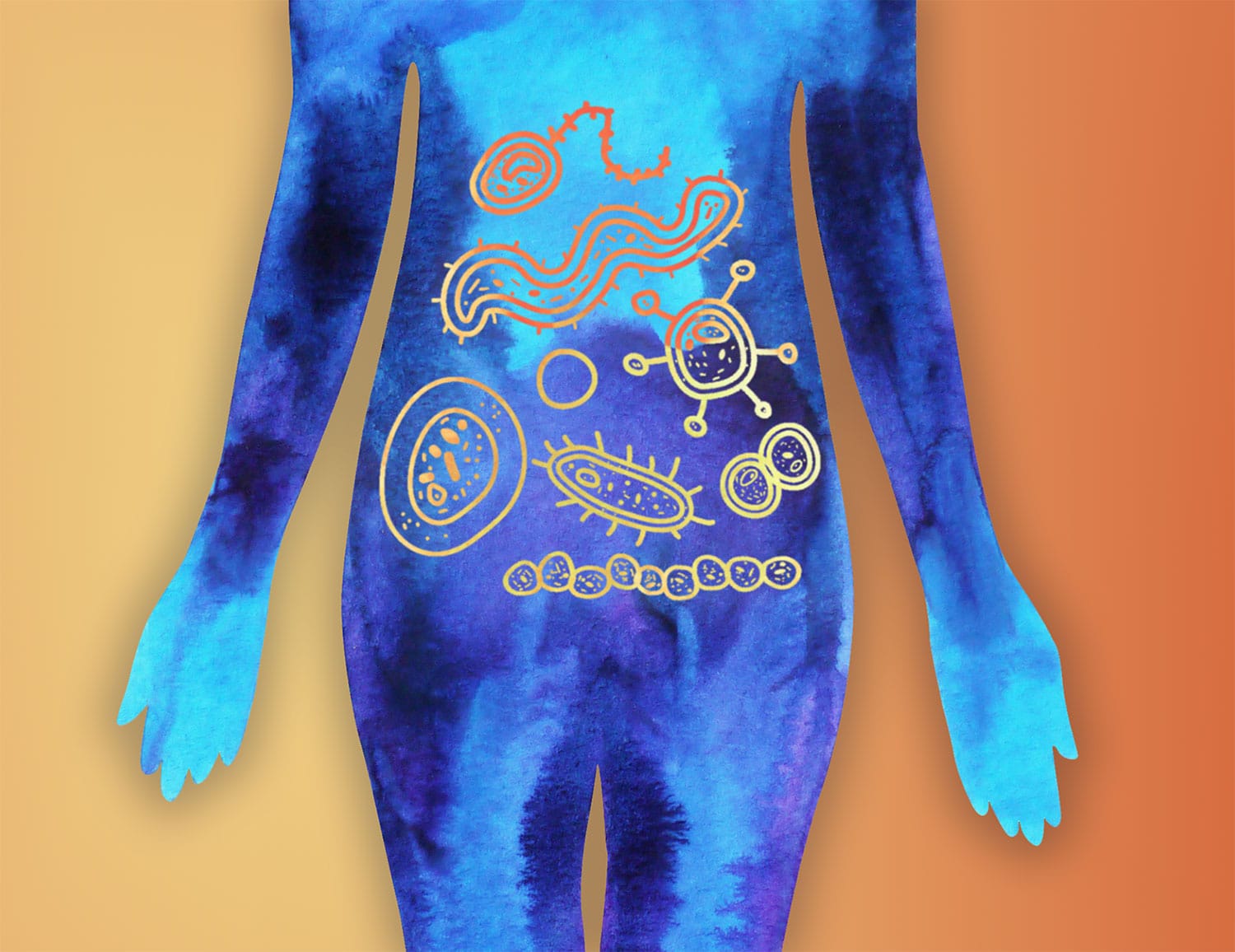RESEARCHERS HAVE SUSPECTED FOR SEVERAL YEARS NOW that the microbes living in the digestive tract—called the gut microbiota—play a role in whether or not cancer patients will respond to immunotherapy drugs called checkpoint inhibitors. An open question has been whether patients should make diet and lifestyle changes in response to this information. Should they take probiotic supplements? Eat or avoid certain foods?
Research presented in April 2019 at the American Association for Cancer Research (AACR) Annual Meeting in Atlanta by clinicians and scientists from the University of Texas MD Anderson Cancer Center in Houston shows that diet may indeed affect whether a cancer patient responds to immunotherapy, likely by modulating the gut microbes and their environment. Further, the data indicate that common probiotic supplements are associated with potentially negative changes to the microbiota. (The AACR publishes Cancer Today.)
Cancer Today spoke with Carrie Daniel-MacDougall, a nutritional epidemiologist at MD Anderson, about this research and related findings. Daniel-MacDougall is part of an international team investigating how diet and lifestyle can mediate response to anti-PD-1 immune checkpoint inhibitors, which are approved by the U.S. Food and Drug Administration for treatment of more than a dozen cancer types.
Q: You and your colleagues are among those working to understand how a patient’s gut microbiota is connected to their response to anti-PD-1 immune checkpoint inhibitors. Why is this important to study?
A: There is quite a bit of literature on how the diets of healthy individuals are linked to the gut microbiota. In 2018, three different research groups, including ours, showed that a patient’s gut bacteria composition seemed to predict whether the patient will or will not respond to anti-PD-1 immunotherapy.
These studies were done in metastatic melanoma patients in the U.S. and in lung and kidney cancer patients in Paris, France. Among the studies, there were combinations of bacterial species associated with a response to anti-PD-1 immunotherapy. We already knew that many of these species are likely functionally important to maintain a healthy gut microbiota, and the gut microbiota supports a healthy immune system. The diet supports the gut microbiota, the gut microbiota supports the immune system and the immune system is important for a patient to mount an anti-tumor response. The immunotherapy works by helping a patient’s immune system work harder and better to kill cancer cells.
For cancer patients, we want to use the gut microbiota as an ally to fight the cancer. So, the important question we are addressing now is how to better ready the gut microbiota so that when we give a cancer patient immunotherapy, they are more likely to respond to the treatment.
Q: You and your colleagues are now studying how diet and probiotic supplements affect the microbiota and can potentially change the way a patient responds to checkpoint inhibitors. Could you talk about this research?
A: It is not a new concept that diet and proper nutrition are important for a well-functioning immune system and that the microbiota supports our gut and immune health. The gut microbiota changes depending on the individual’s diet and lifestyle and likes fiber-rich plant foods. We want to know what aspects of the diet are important and what changes a patient could potentially make to change their gut microbiota for the better, to have a higher chance of responding to immunotherapy. In our study, we gave diet surveys to melanoma patients at MD Anderson starting treatment with an anti-PD-1 immunotherapy. We followed their response to treatment and analyzed their gut microbiota.
Q: What did you find?
A: A high-fiber diet appears to promote a more beneficial gut microbiota profile that is more predictive of response to anti-PD-1 therapy in our melanoma patients. While the dietary fiber-microbiota link has been shown many times in healthy populations, this has not been shown in cancer patients or in the setting of cancer treatment. Fiber from a variety of sources—whole grains, vegetables, fruits and legumes—is beneficial and stimulates a diverse set of beneficial bacteria in the gut. Conversely, we also saw that patients who reported taking a probiotic supplement had a less diverse gut microbiota.
Q: How are you continuing to study the links between the diet, gut microbiota and immunotherapy response?
A: Given our results on the potential importance of fiber in the dietary survey, we are also initiating a controlled diet trial that will compare patients eating a healthy, high-fiber diet to those eating a healthy diet but without a high-fiber component and follow them over the course of their immunotherapy treatment. The pilot feasibility study is open now and the immunotherapy portion is schedule to open in 2020. My colleagues are also studying how fiber and probiotics can influence the gut microbiome using animal models.
Q: What do you want patients to know about this research, and do you have any recommendations for them?
A: This evidence is new but the beauty is that there is not much harm in eating a healthy, balanced, whole-food diet, where you meet your needs with unprocessed foods, as opposed to turning to supplements, fiber powders or even packaged foods fortified with fibers. We are moving as quickly as we can to study the effects of a whole-food diet for cancer patients to increase the number who may benefit from immunotherapy. We need to better understand why probiotics don’t help and may even be harmful. The American Institute for Cancer Research has dietary guidelines for cancer patients that are well informed and follow a sensible approach that includes a recommendation to choose healthy foods over supplements. For now, I think that’s the best approach.
Cancer Today magazine is free to cancer patients, survivors and caregivers who live in the U.S. Subscribe here to receive four issues per year.





